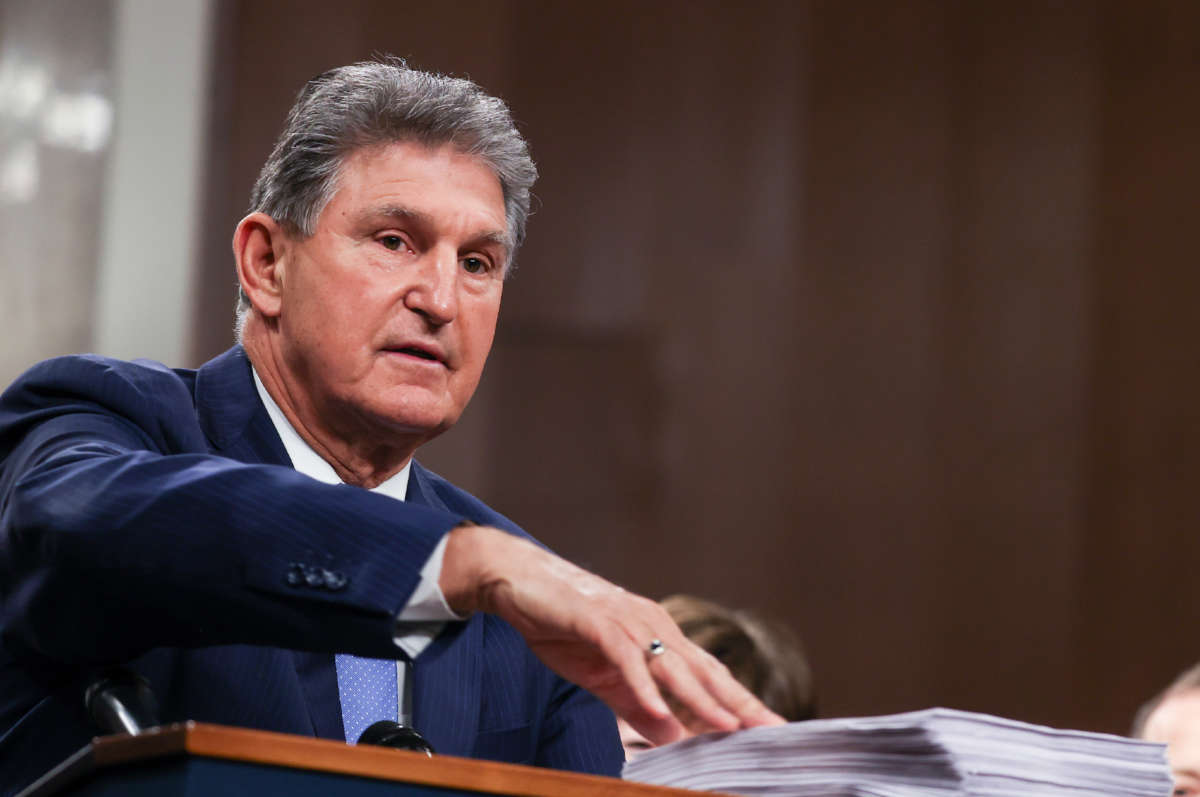West Virginia Democratic Senator Joe Manchin announced on Monday he would support pro-union legislation that passed the House of Representatives last month, clearing the first of many obstacles that still remain toward its eventual passage in the Senate.
“I am pleased to announce that I am co-sponsoring the PRO Act,” Manchin said while speaking during a virtual event put on by the National Press Club.
“I look forward to working with my colleagues on both sides of the aisle to move this bill through a legislative process,” he added.
In other comments about the bill, Manchin noted that “50 percent of unions fail in their first year of organizing.”
“This legislation will level the playing field,” the senator said.
Manchin’s decision to support the passage of the PRO Act allows it to clear a huge hurdle, as the centrist’s views on the bill weren’t clear before Monday. There are other Democrats, however, who have not yet stated where they stand on the matter.
Senators Mark Kelly and Kyrsten Sinema, both Democrats from Arizona, have not yet signed on as co-sponsors for the legislation. Nor has Sen. Mark Warner (D-Virginia).
Both Kelly and Warner may be facing conflicts of interest owing to their having received campaign contributions from Amazon — Kelly has received more than $139,000 from the company, while Warner has received almost $45,000. Amazon successfully fended unionization efforts at its facility in Bessemer, Alabama, earlier this month, using questionable means that would be deemed illegal if the PRO Act became law.
Under the provisions found in the PRO Act, an employer would be prohibited from interfering in union elections, and would not be allowed to require workers to attend anti-union meetings put together by the company — two tactics that Amazon used in order to defeat the unionization vote in Bessemer. The bill also creates financial penalties for companies that violate labor laws and rules, allowing the federal government more enforcement tools to prevent anti-union actions.
The bill has many other pro-worker provisions, including overriding so-called “right-to-work” laws in states across the country that allow workers in union-represented jobs to undercut the union by opting out of paying dues (while still reaping the benefits won for workers in those jobs). The bill also recognizes the rights of independent workers, including those in the so-called “gig economy,” to unionize.
There remain other obstacles, however, beyond some Democratic lawmakers not yet voicing their support for the bill. While a 50-vote threshold would allow Vice President Kamala Harris to cast the tie-breaking vote for the PRO Act, the threat of a filibuster may result in Republicans in the Senate successfully blocking the bill from being passed.
Efforts to bypass the filibuster, such as including the bill as part of an amendment to a law that was passed through reconciliation, may also fail, as the Senate parliamentarian may not agree that the legislation is a legitimate amendment related to the pandemic economic relief that was passed in March.
Still, Manchin’s decision to sign on to the PRO Act is a significant step, demonstrating that anything is possible at this point, and that things are moving in a positive direction for Democrats, for the time being at least.
If passed by the Senate, President Joe Biden has signaled he will sign the bill into law. “I believe every worker deserves a free and fair choice to join a union — and the PRO Act will bring us closer to that reality,” Biden said last month.
Join us in defending the truth before it’s too late
The future of independent journalism is uncertain, and the consequences of losing it are too grave to ignore. To ensure Truthout remains safe, strong, and free, we need to raise $34,000 in the next 72 hours. Every dollar raised goes directly toward the costs of producing news you can trust.
Please give what you can — because by supporting us with a tax-deductible donation, you’re not just preserving a source of news, you’re helping to safeguard what’s left of our democracy.
